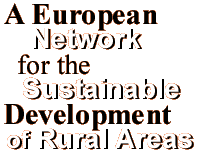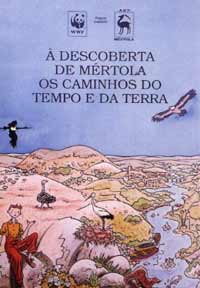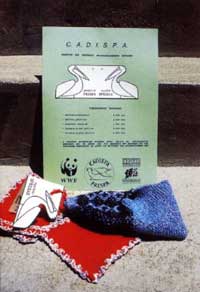|
The
CADISPA Programme
|
 |
|
 In
1989, the WWF-Inter-national and the European Union - General Direction
XI - created the CADISPA (Conservation and Development in Sparsely
Populated Areas) programme. Through Europe, this programme was able
to gather a group of motivated people with various experiences and
skills and a common effort to reach the
goal: help the local communities
in the sparsely populated areas of Europe in their attempt to improve
their economical condition, without compromising their rich cultural
and natural heritage. In
1989, the WWF-Inter-national and the European Union - General Direction
XI - created the CADISPA (Conservation and Development in Sparsely
Populated Areas) programme. Through Europe, this programme was able
to gather a group of motivated people with various experiences and
skills and a common effort to reach the
goal: help the local communities
in the sparsely populated areas of Europe in their attempt to improve
their economical condition, without compromising their rich cultural
and natural heritage.
CADISPA is an innovative development programme.
The projects were developed "bottom up",
by the people of local communities that analyse their situation
and are able to find the adequate solutions to solve the problems
found. It stimulates the rural populations to develop
and improve their abilities to be able to take over their
own future. CADISPA is a project for people
and gives people the main role
in its priorities.

The CADISPA programme started as an environmental education programme
for the Scottish islands and highlands, but it went a very long
way. Since then, it developed and spreaded in a network including
six European countries, Greece,
Italy, Portugal, Scotland, Spain and Sweden, where the protection
of the environment is connected with economical development, using
very different methods.
|


|
|
In
Scotland, for example, the CADISPA programme involves the initiatives
of the local communities and offers opportunities
to find a job, especially for women in remote areas.
An environmental education programme in Aspromonte and in the Cilento
regions became a CADISPA programme which helps answering the needs
of the local communities using also the potentialities
offered by agriculture and rural tourism.
In the National Park of the Aspromonte an old trail followed by
the English writer Edward Lear in 1850 was re-discovered. It has
now become a beautiful trekking trail along which several families
offer their hospitality to the
tourists. The WWF’s mail-order catalogue allowed to present all
over Europe and in Japan the organic olive
oil produced by a local cooperative in the National Park
of the Cilento and Vallo di Diano, in the framework of the project.
Moreover, new initiatives of eco-sustainable green tourism were
designed and implemented.
Around the lake Prespa, in Greece, the activities of the CADISPA
project give new job opportunities with green
tourism and, at the same time, the production of organic
beans cannot satisfy the big demand of the market.
In the village of Mertola, in Portugal, the ancient
weaving activity was re-created, and the old wind and
water mills have been restored and could start working again.
In the southern part of Spain, the CADISPA project worked with the
local governments to raise the awareness
about the importance of the environment and improve the
measures of conservation adopted.
In Sweden, the Saami population used the support offered by the
CADISPA network to protect their rights
as a population raising reindeer, for their rights go back to 10,000
years ago.
|
 |
|
In
Italy, this project was implemented in the National Parks of the
Aspromonte and of the Cilento-Vallo di Diano.
The
following activities have been carried out:
-
promotion and public awareness campaigns;
-
environmental
education and awareness activities;
-
training
courses for teachers;
-
training for tourist operators;
-
training for olive oil producers about eco-sustainable techniques;
-
research and enhancement of local handicraft and products;
-
analysis of the area and socio-economical studies;
-
rural animation activities;
-
activation of pilot-projects for eco-compatible activities;
-
creation of a network of widespread hospitality in the National
Park of the Aspromonte
|
 |
| The
CADISPA Programme |
  |
|
|
